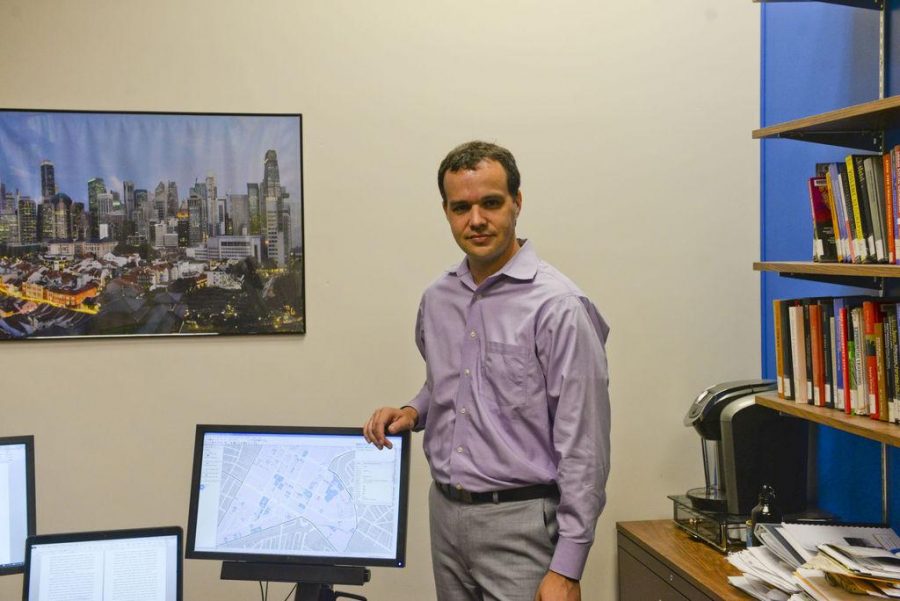The first thing you notice entering Pitt Urban Studies professor Michael Glass’ office is the picture of Singapore’s skyline above his desk, where he takes students interested in Southeast Asia to study every other summer.
His walls are lined with shelves of books of foreign places, like postcards of his studies. “From Third World to First,” “Megaregions” and “Blank Spots on the Map” are a few provoking titles of Glass’ expertise.
Glass, who won the prestigious Bellet Award for Teaching in March, has lectured in the Urban Studies Department at Pitt for seven years. In his office, located in the History Department, he walks barefoot, having just finished brewing a cup of coffee. The well-traveled New Zealand native sat down with The Pitt News to chat about his background in geography, his stint on NPR and his homeland.
The Pitt News: What made you want to study geography?
Michael Glass: I come from New Zealand. Throughout the commonwealth, geography is a very well-established discipline. It’s a little less common [in the U.S.]. It was always a good way for me to understand the world and get to explore more of it.
TPN: Is there a type of geography you specialize in?
MG: The geography I do is broadly known as human geography, so we’re interested in where people are, how cities develop, the interactions between cities or within the same country. So it’s not just memorizing state capitals — you can use Google for that. It’s understanding ‘why did Pittsburgh develop the way it did?’ or ‘what links Pittsburgh to other places?’
TPN: Growing up in New Zealand, how did you decide you wanted to go to school for geography?
MG: I did my Masters degree at the University of Auckland, which is one of New Zealand’s top research universities. My advisor had done his Ph.D. at Penn State and said it would be a pretty good fit. I applied, got in and I’ve been in Pennsylvania ever since.
TPN: Last spring, you were featured on NPR for your research. What were you researching?
MG: One of the key classes I teach for the Urban Studies Program is Urban Studies 1300, a research skills class, and it’s neighborhood-based. In fall 2014, [my students] had been in the South Side. That got some attention because we were working with the city, looking at the nighttime economy. We were looking at perceptions of the South Side by visitors and residents and just seeing what the presence of so many bars on the South Side was doing to the different communities that live, work and play there.
TPN: What kind of research are you doing now?
MG: Every second year I take students to Southeast Asia, and I’m interested in how they understand and learn about different cities. It’s one thing to learn about Singapore on campus, but how do the students interact with that place once they get there? My current book project is looking at where some of Pennsylvania developed, how the city developed over time, kind of a political perspective on that.
TPN: Do you have a favorite city that you have studied or visited?
MG: In North America, I’m fairly fond of places like Chicago and Montreal. I’ve just been to a lot of great cities. Munich, Helsinki, Kuala Lumpur. That’s the good thing about studying geography — it gives you an excuse to visit all of these places.
TPN: Is there anything that you haven’t researched yet that you would like to?
MG: I’m doing it. Allegheny County has 130 municipalities. Very often people say that’s just really inefficient and it makes things difficult. Everybody says it’s a problem and I wanted to look at how the problem arose and whether it is a problem.


